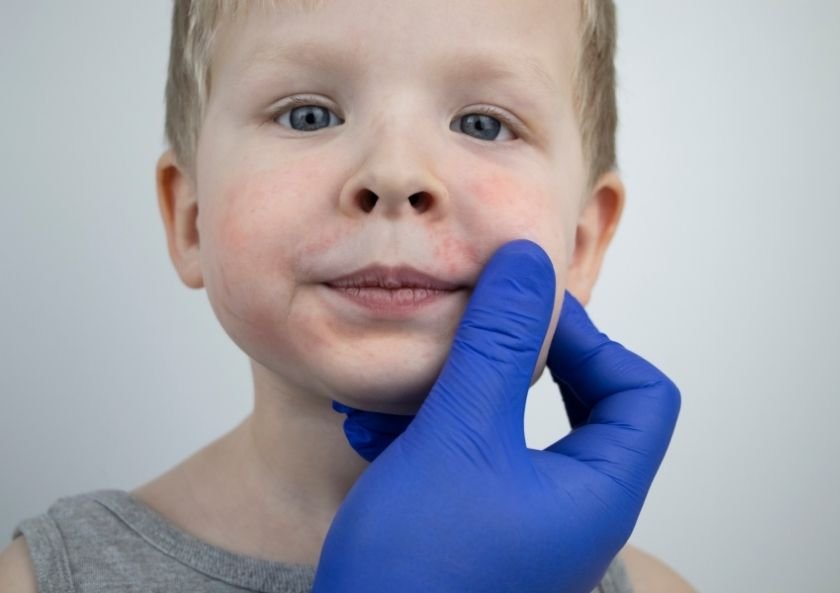Eczema is a skin disease that occurs as a result of allergies or causes that disrupt the skin barrier, which is one of the skin conditions faced by many people. While the importance of food allergies in eczema especially in infants is great, the importance of food allergy decreases at older ages. It is very important to diagnose and regulate treatments for those with eczema symptoms.
What is Eczema (Atopic Dermatitis)?
Atopic dermatitis is a common allergic skin disease in infants and adults. It manifests itself with itchy rashes on the cheeks and joints, especially in infants, as a result of defect in the skin barrier. As the age increases, it manifests itself as an itchy rash in the joints and hands. There is skin dryness. The water content and oil content of the skin decreased. Therefore, the skin is prone to dryness.
What are the Symptoms of Eczema?
It can vary according to age. Babies have itchy rashes on the cheeks, neck, behind the ears, on the outer face of the arms and legs. These itchy rashes become more prominent in the joints as the age gets older. The skin is dry. The more pronounced eczema in the joints is associated with the more sensitive the amount of water and oil in the skin of the joints. There is insomnia due to itching. Sometimes itchy rashes are prone to infection. Easy infection develops.
What Causes Eczema (Atopic Dermatitis)?
The main reason is based on genetics. It can develop due to various reasons that disrupt the skin barrier on a genetic basis and food allergies. The effect of food allergy in infants, especially under 12 months, is around 40%. This rate decreases as the age increases and this rate is less than 1% over the age of 5 years. In older children, this disease develops for various reasons that disrupt the skin barrier.
The skin barrier deteriorates for various reasons. The skin is sometimes extremely dry due to genetic reasons. Some people have extremely dry skin as a result of a mutation. Sometimes the skin dries out with the effect of shampoos. As a result of skin drying, the pH value of the skin increases. When the pH of the skin increases, the tendency to infections increases. Microbes called staphylococci settle on the skin and as a result, the skin barrier is further deteriorated. Eczema occurs as a result of disruption of the skin barrier.
How Is Eczemhttp://en/what-is-eczema-atopic-dermatitis/a Diagnosed?
The diagnosis of eczema is actually very easy clinically. Allergists, who are especially experienced in eczema, diagnose according to the examination findings. In the diagnosis, it is important that the eczema rashes are located, the skin is dry and itchy. According to clinical findings, an experienced physician usually makes a diagnosis without the need for any analysis.
How Is Eczema Treated?
First of all, it is very important to find the cause. Since food allergy can be the primary cause especially in small babies, allergy test should be done for food allergy from skin or blood. Food allergy can sometimes be due to a hidden allergy that does not come out of the skin or blood. The diagnosis of latent allergy is made by taking the food into the diet and then loading it. If there is a food allergy, treatment is carried out by taking the allergic person into the diet and restoring the skin barrier.
In the restoration of the skin barrier, it should be treated with protective moisturizers that correct the eczema lesions and then prevent the deterioration of the skin barrier. If the dryness of the skin barrier is prevented and moistened, the pH value of the skin decreases. As a result, the skin’s tendency to infection is also reduced. The development of eczema lesions is also reduced.
Bathing is very important in strengthening the skin barrier. Because with the bath, the settlement of microbes called staphylococci on the skin is prevented and this strengthens the skin barrier. After bathing, it is necessary to use a moisturizer to prevent skin dryness.
Putting rice, oat or corn starch in a basin of water before bathing and keeping the baby in water for 5-10 minutes helps soften the skin, increase its water holding ability and reduce thickening. For these reasons, this method should be applied in periods when eczema flares up.
Which Doctor Should Be Seen for Eczema ?
In particular, allergists have received training. It is a more accurate approach to diagnose and treat children under the age of 18 by pediatric allergists (new name Pediatric Immunology and Allergy Specialists), and by adult allergy specialists (new name Immunology and Allergy Specialists) in children older than 18 years. Because these are the specialists who receive special training to find the underlying cause and to regulate the treatments, and to take precautions to prevent the development of allergic asthma and allergic rhinitis that may develop later.
As a result;
- It is a common allergic skin disease in children and adults.
- It develops as a result of genetic and environmental factors and causes that disrupt the skin barrier.
- Food allergy is one of the causes of eczema. While it is one of the more common causes in young babies, the importance of food allergy decreases at older ages.
- Diagnosis of food allergy is based on clinical findings.
- Eczema treatment is done by avoiding the causes of eczema and restoring the skin barrier.
- Pediatric allergists up to the age of 18 in the diagnosis of eczema, it is a more correct approach to be performed by adult allergists for those older than 18 years of age. These specialists are doctors who have received special training in eczema and allergy diseases.



